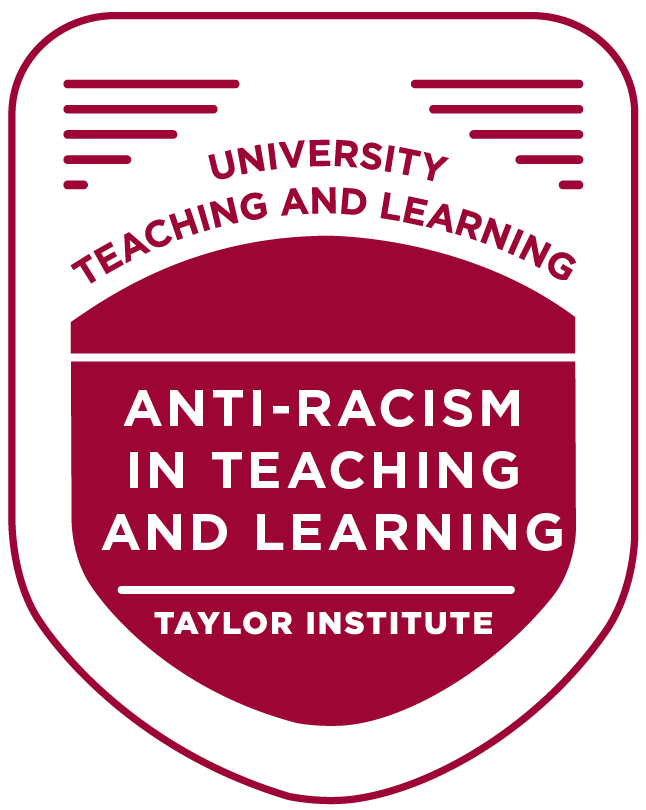
Program overview
The Anti-Racism in Teaching and Learning badge explores white supremacy, intersectionality, and racism as a system of oppression within postsecondary teaching and learning to help participants develop an anti-racist lens in their pedagogy. Using critical race theory as a conceptual framework, participants will examine anti-racist pedagogies by interrogating the role of white supremacy in perpetuating oppression, followed by applied learning around taking an explicitly anti-racist approach to course development and design. The capstone project will involve participants developing a course plan or learning activity specific to their context, chosen in consultation with the instructors, using an anti-racist framework.
Please register before the April 28 deadline.
Course introduction
Introduction to course materials and community building
Date and time: Friday, May 2 | 12 – 1:15 p.m.
Facilitators: Dr. Fouzia Usman & Dr. Heather Jaminckzy
Week 1: May 5-9
Module 1: Introduction to Critical Race Theory
Date and time: Friday, May 9 | 12 – 1:15 p.m.
Facilitators: Dr. Fouzia Usman & Dr. Heather Jamniczky
Asynchronous Learning: Readings and discussion post on D2L
Week 2: May 12-16
Module 2: Understanding Whiteness
This module will examine how white supremacy manifests in postsecondary environment and participants will be invited to explore ways to decenter whiteness in their curriculum and teaching.
Date and time: Friday, May 16 | 12 – 1:15 p.m.
Facilitators: TBD
Asynchronous Learning: Readings and discussion posts on D2L
Week 3: May 19-23
Module 3: Antisemitism in Post-Secondary Education
This module will focus on Antisemitism and ways to combat that in the teaching and learning environment.
Date and time: Friday, May 23, 12 – 1:15 p.m.
Facilitators: Dr. Shirley Steinberg
Week 4: May 26-30
Module 4: Anti-Muslim Racism in Post-Secondary Education
This module will focus on Anti-Muslim racism and ways to combat that in the teaching and learning environment.
Date and time: Friday, May 30 | 12 – 1:15 p.m.
Facilitators: Dr. Aamir Jamal
Asynchronous Learning: Readings and discussion posts on D2L
Week 5: June 2-6
Module 5: Anti-Asian Racism in Post-Secondary Education
This module will focus on Anti-Asian racism and ways to combat that in the teaching and learning environment.
Date and time: Friday, June 6 | 12 – 1:30 p.m.
Facilitators: Dr. Hieu Ngo
Asynchronous Learning: Readings and discussion posts on D2L
Week 6: June 9-13
Module 6: Anti-Black Racism in Post-Secondary Education
This module will focus on Anti-Black racism and ways to combat that in the teaching and learning environment.
Date and time: Friday, June 13 | 12 – 1:15 p.m.
Facilitators: Dr. Patrina Duhaney
Asynchronous Learning: Readings and discussion posts on D2L
Week 7: June 16-20
Wrap Up and Reflections
Date and time: Friday, June 20 | 12 – 1 p.m.
Facilitators: Dr. Fouzia Usman & Dr. Heather Jamniczky
Capstone project
Course participants will have until Sept. 30, 2025 to submit their capstone project.
Program details
This badge is open to all course instructors at the University of Calgary.
Participants must also have completed the online Anti-racism, EDI and Positionality learning module at the Taylor Institute by April 28, 2025.
With limited registration, instructors are encouraged to submit an expression of interest for the Spring 2025 cohort. Registration closes on Monday April 28 and individuals will be notified before May 2 if they are participating this year.
By completing the required elements, participants can qualify for the Anti-Racism in Teaching and Learning Badge. Requirements include:
- Participation in the program, in person and online
- Develop a course plan or learning activity using an anti-racist framework (capstone)
- Successful completion of all modules
By the end of this badge, you will be able to:
- Describe the role of white supremacy and white privilege in upholding structural racism in postsecondary education.
- Identify examples of anti-Black racism, Antisemitism, anti-Asian racism, and Anti-Muslim racism in postsecondary education.
- Develop strategies to implement anti-racist pedagogy that specifically targets anti-Black racism, Antisemitism, anti-Asian racism, Anti-Muslim racism in your teaching and learning context.
- Articulate how to decenter whiteness in the curriculum.
This cohort-based badge will be delivered over a course of seven weeks. Modules will be delivered in a blended format, through synchronous and asynchronous (guided self-directed) sessions on D2L. There will be eight scheduled synchronous sessions (60-75 minutes) and participation in ALL sessions will be mandatory. All in-person sessions will occur at the Taylor Institute for Teaching and Learning, TI 250.
Instructors
Dr. Fouzia Usman, Dr. Heather Jamniczky, Dr. Patrina Duhaney, Dr. Aamir Jamal, Dr. Hieu Ngo, Dr. Shirley Steinberg
Frequently Asked Questions
-
Why are there so few spots in the badge program?
Due to the complexity of the topic and the face-to-face classes for this badge, the registration is limited to ensure safe spaces for discussion, exploration and challenging conversations about racism, whiteness, and intersectionality.
-
Will there be a waiting list?
If we reach capacity for the fall 2023 cohort, we will retain expressions of interest for future consideration or if someone is unable to participate as planned.
-
I can’t participate in person. Can I still be a part of this badge?
Unfortunately, no. This badge requires 7.5 hours of face-to-face instruction, as well as asynchronous D2L engagement and a capstone project, for completion.
-
Why is anti-racism an important topic in teaching and learning?
The need for anti-racism pedagogy in postsecondary learning is becoming increasingly important, as student demographics continue to change. BIPOC students may feel overlooked, ignored, or experience racism in their own university career. The need for instructors to better support students within their own cultural contexts is critical for a positive and beneficial student experience.
-
How is this different than other EDI workshops?
Anti-racism and critical race theory require regular and consistent self-examination and active participation to oppose systems of oppression, like racism. This work is challenging, intensive and can be considered an ongoing practice, instead of a one-time learning.
-
Why should I use an anti-racism lens in my pedagogy?
Anti-racism and critical race theory are essential for faculty development in post-secondary institutions. While anti-racist materials and strategies can be thought of as tools, instructors are the catalysts for change in their student spaces, to create more inclusive and equitable learning opportunities for everyone.

